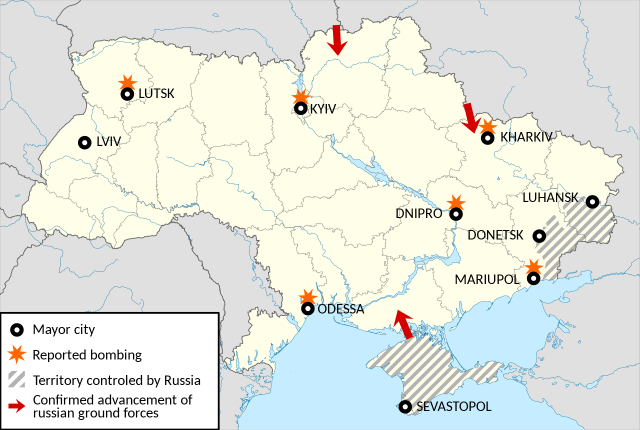
Since the early morning hours, the Russian invasion of Ukraine has affected the financial markets, particularly the Russian economy, creating fears and scepticism among investors and the Russian citizens.
On February 24th, 2022, the Russian military troops started their invasion of Ukraine from different geographical locations marking the beginning of a conflict that directly involved Europe.[1]
Since the beginning of the Russian attack, the Moscow Stock Exchange has burned 260 billion dollars losing around 50% of its value in the early morning hours. Fears and worries started driving the financial markets considering that the investors, concerned that the Western sanctions might be the toughest in history, began selling the bonds in Moscow. Consequently, the ruble dropped to an all-time low level against the dollar, and the cost of securing Russian debt against insolvency rose to its highest since 2009. Among the key Russian state companies, Sberbank lost 49%, Rosneft 44%, Tatneft 40%, Gazprom 40%, and Lukoil 28%.[2]
After the news that the Russian military troops launched an extensive airstrike operation against the Antonov International Airport, 15 minutes away from the Ukrainian capital Kyiv, the European markets also registered a negative performance, such as the Wall Street futures.
The president of the European Commission, Ursula von der Leyen, confirmed that the European Union would do everything possible to stop the Russian military actions in Ukraine by adopting the most demanding sanctions package, which will include financial sanctions to restrict Russian access to capital markets severely and hugely impact the Russian economy. The sanction’s purpose is to block Russian economic growth, increase inflation, erode its industrial bases and limit Russia’s access to crucial technologies.[3]
Geopolitical analysis
Since the beginning of this year, Russia and NATO have confronted the Ukrainian crisis. The situation worsened on the evening of February 21st, 2022, when Russian President Vladimir Putin signed two decrees on the recognition of the Donetsk People’s Republic (DPR) and the Lugansk People’s Republic (LPR) and two treaties of friendship and mutual assistance with the representatives of the two separatist republics of Eastern Ukraine alarming the international community about a possible imminent conflict and the danger of the presence of Russian military forces in the area.[4]
Although Ursula von der Layen stated that the European Union would impose the toughest sanctions against Russia, these measures will not interfere with the gas market, which is the driving financial sector of the Russian economy. On the one hand, Russian gas accounts for almost 40% of total European imports and the Kremlin might inflict severe punishment on Brussel as retaliation for the sanctions. On the other hand, Russia cannot lose the European market for its energy exports considering that the country is heavily dependent on energy revenues and, recently, has seen negative performance regarding Gross Domestic Product (-0.8%), a reduction in annual GDP growth from 10.5% to 4.3% (data as of September 2021), and an increase in the monthly inflation rate from 0.82% to 0.99% (January 2022).
Russian president Vladimir Putin is testing NATO and Europe by invading Ukraine, hoping that the European Union will be divided in facing this issue. Although neither NATO nor Brussels will send troops in support of Ukraine, as happened during the Russian-Georgian War in 2008, the Western economic sanctions might severely affect the Russian economy, causing disappointment among the Russian citizens and eroding Putin’s popularity support.
Sources
[1] Giuliano Bifolchi, Silvia Boltuc (2022) Russia starts military operations in Ukraine, Russia Insight Volume 15 Issue 2, SpecialEurasia. Link: https://www.specialeurasia.com/2022/02/24/russia-invasion-ukraine/;
[2] Elliot Smit (2022) London-listed Russian stocks are collapsing, with trading now suspended, CNBC. Link: https://www.cnbc.com/2022/03/03/london-listed-russian-stocks-are-collapsing-with-trading-now-suspended.html
[3] European Commission (2022) Statement by President von der Leyen on further measures to respond to the Russian invasion of Ukraine. Link: https://ec.europa.eu/commission/presscorner/detail/en/statement_22_1441
[4] Giuliano Bifolchi (2022) Russia recognised the independence of Donetsk and Lugansk, Russia Insight Volume 15 Issue 1, SpecialEurasia. Link: https://www.specialeurasia.com/2022/02/21/russia-donetsk-lugansk/
Our team constantly monitors the events in Ukraine. For further information, please get in touch with us at this LINK.
